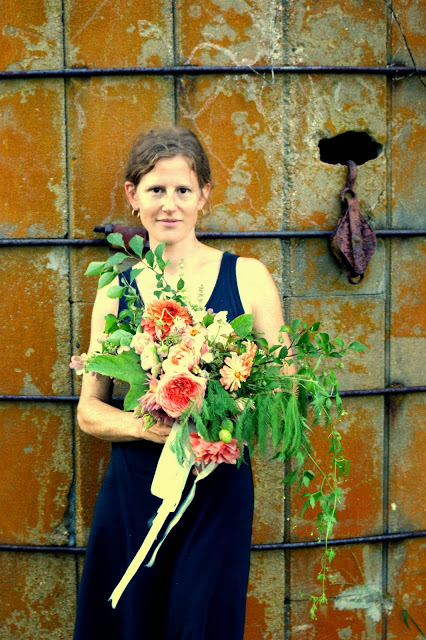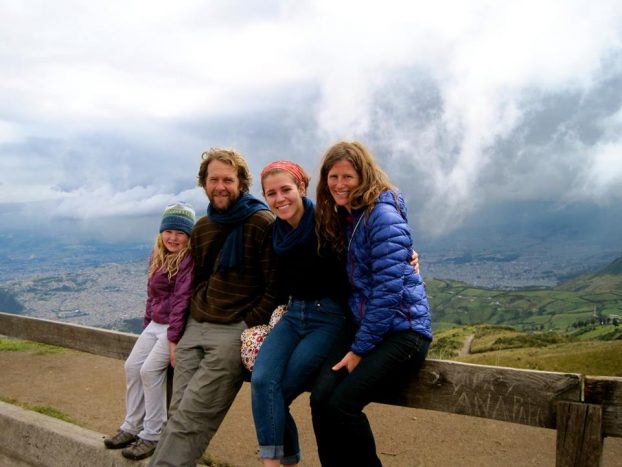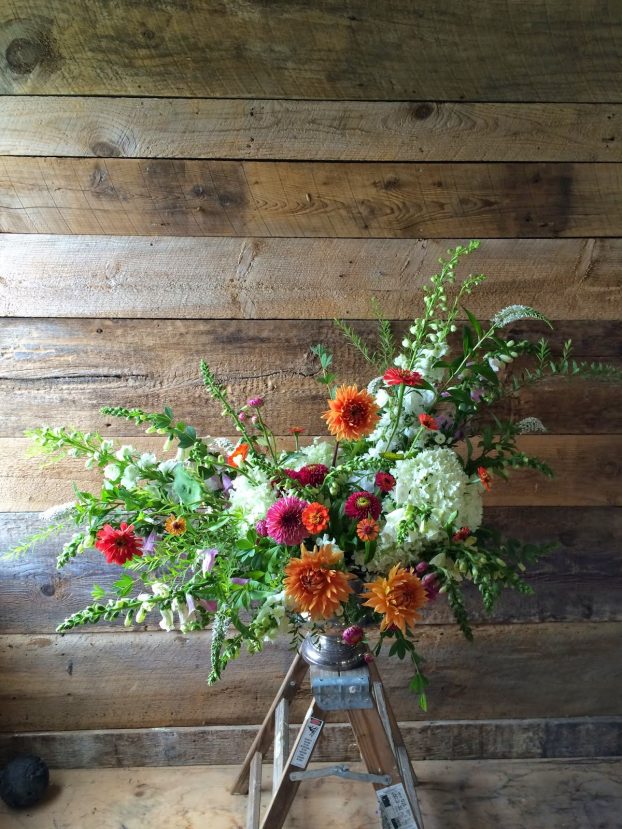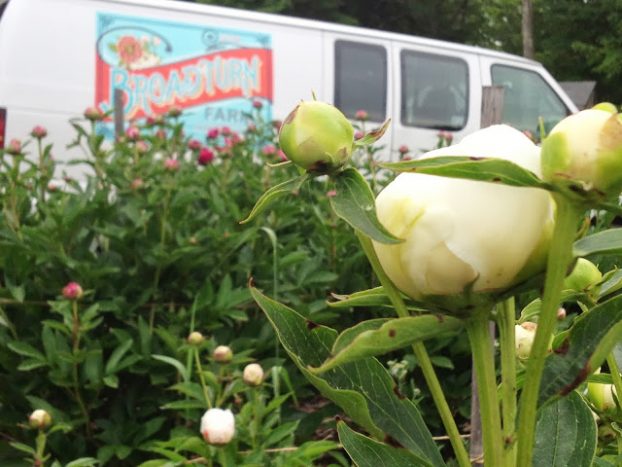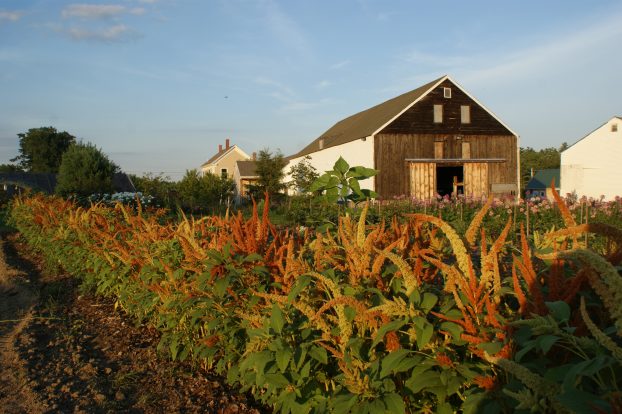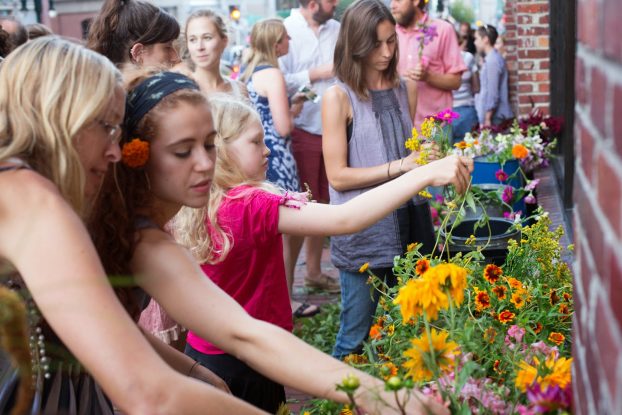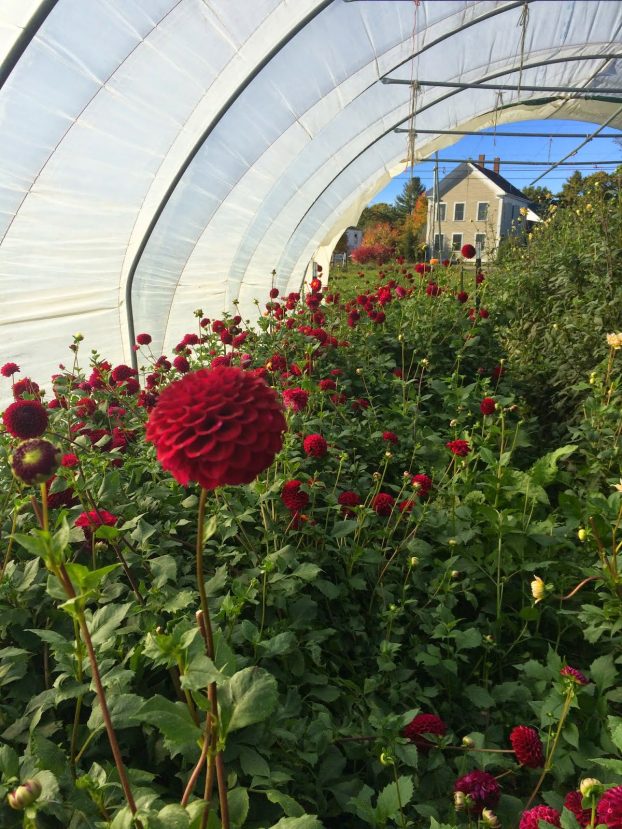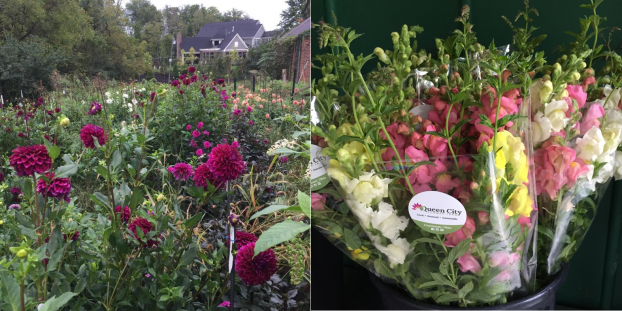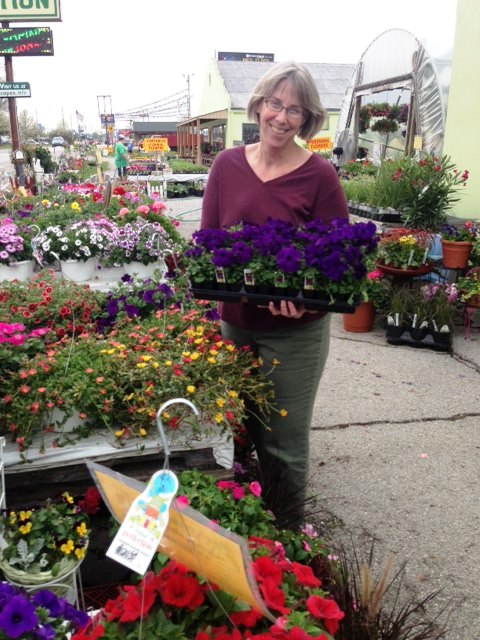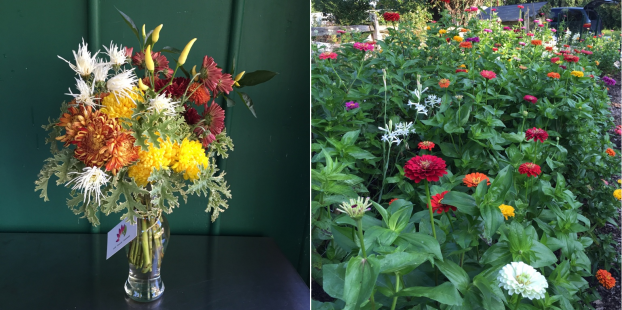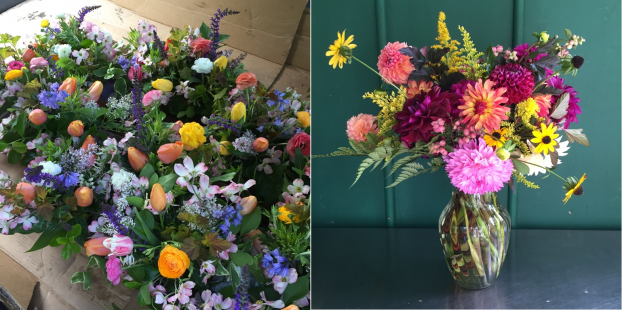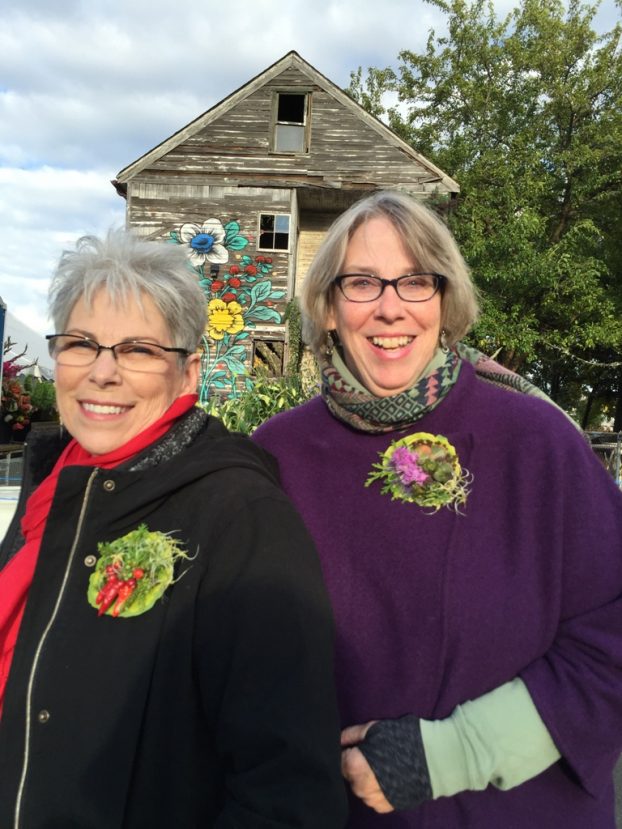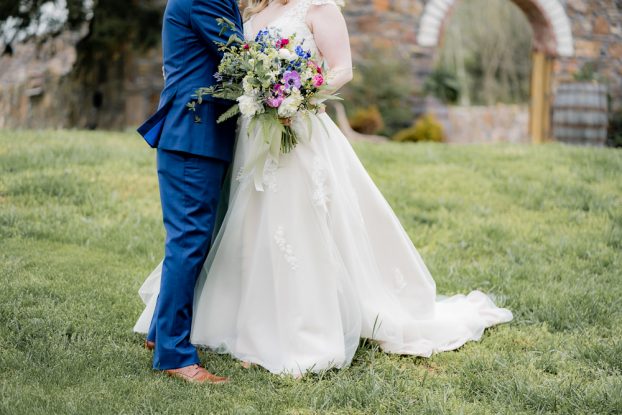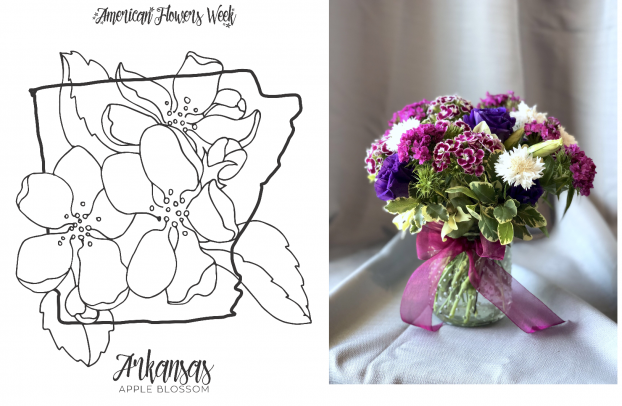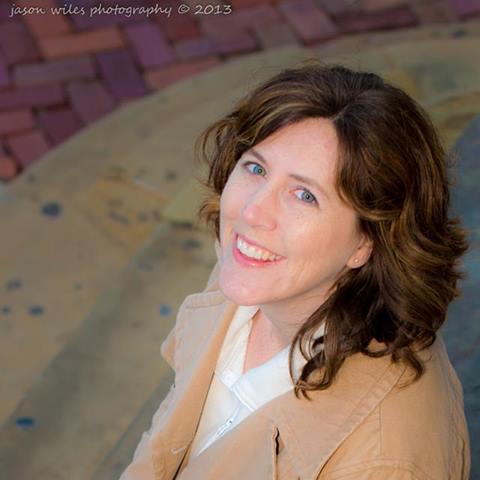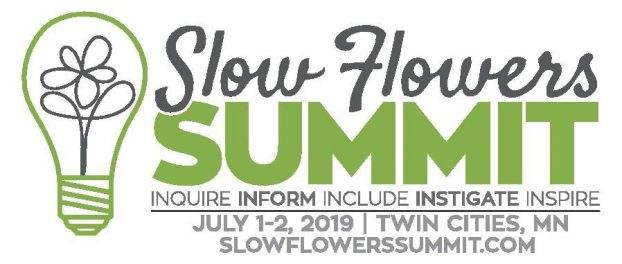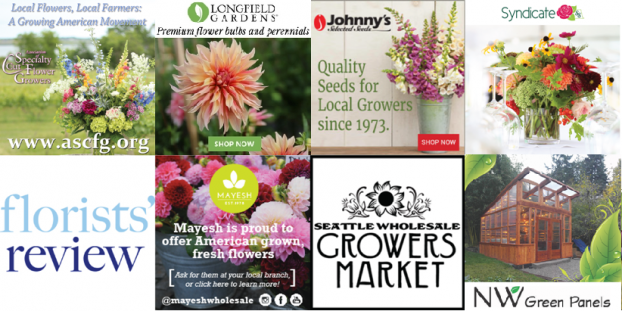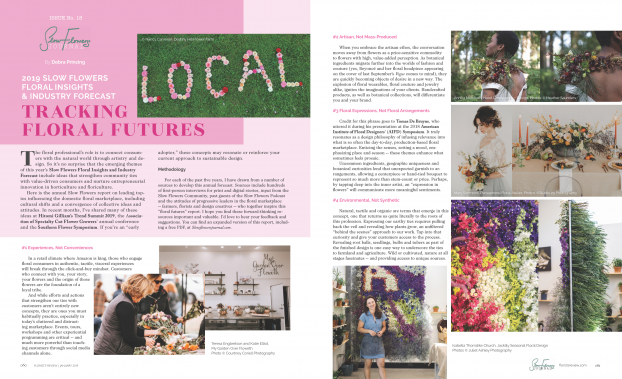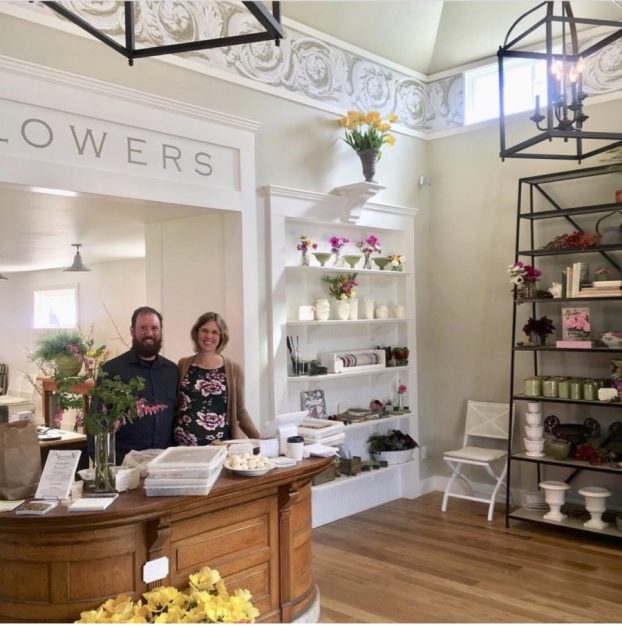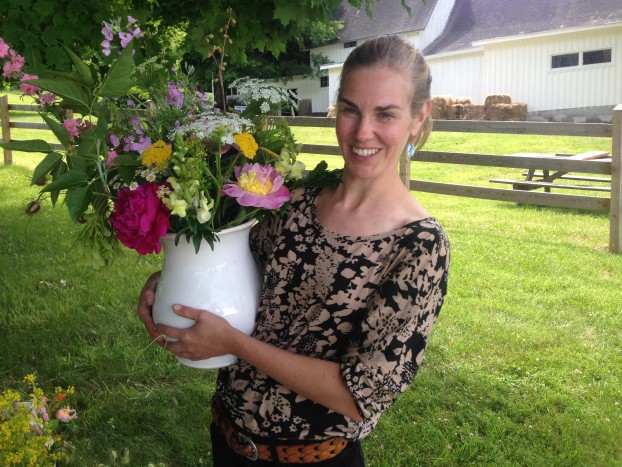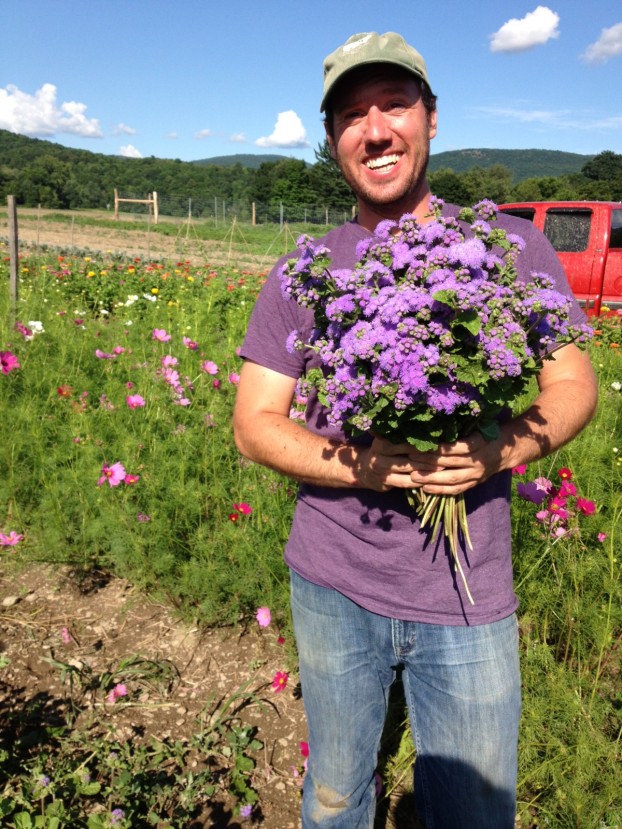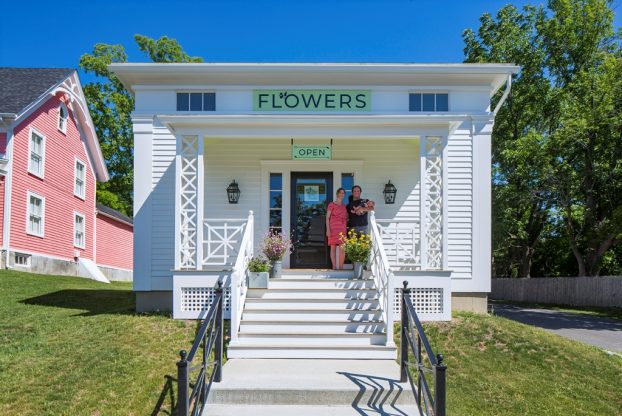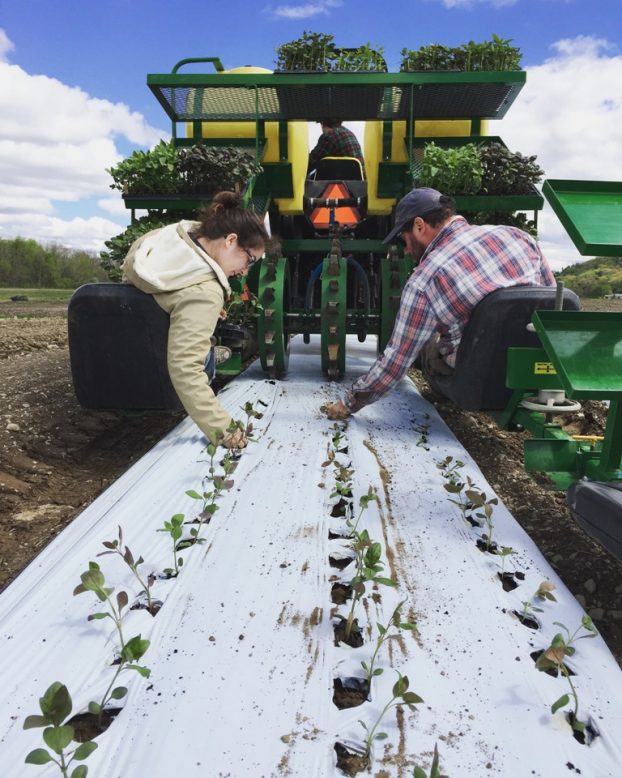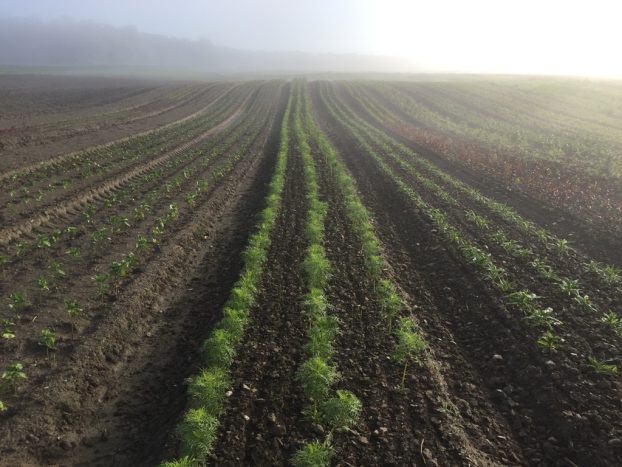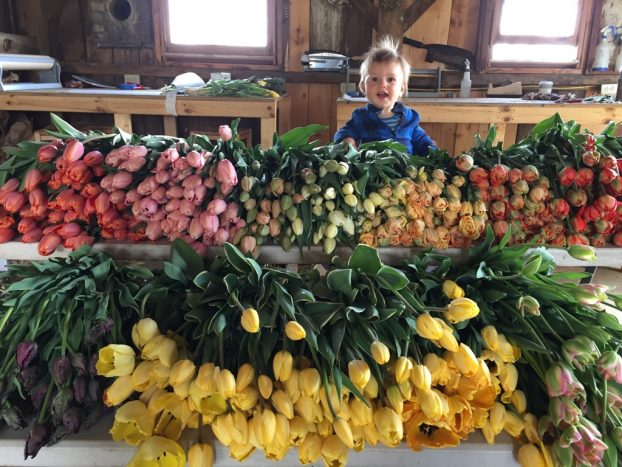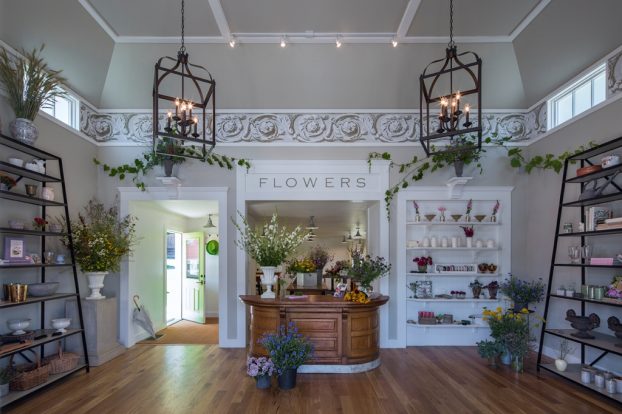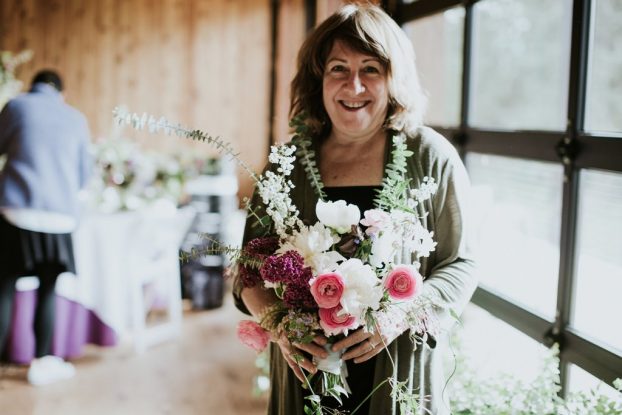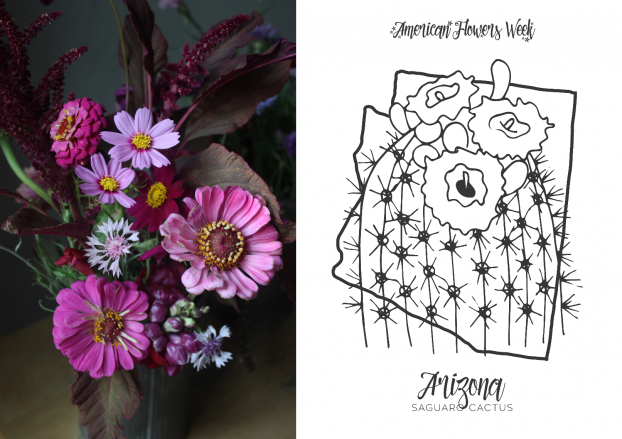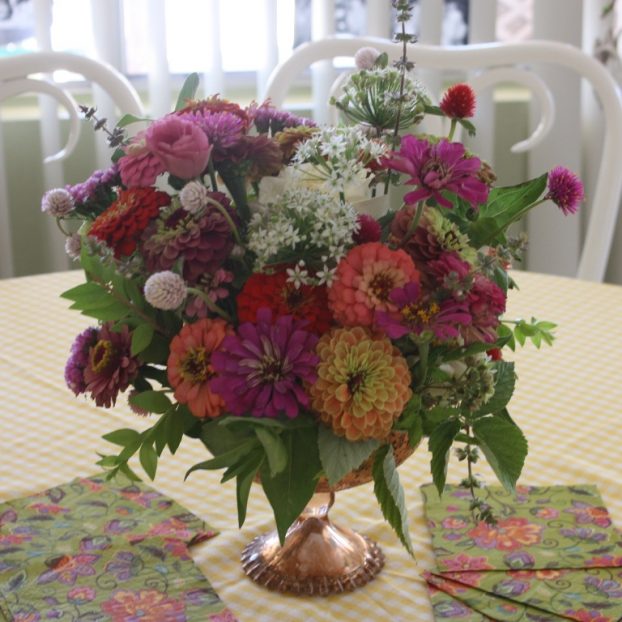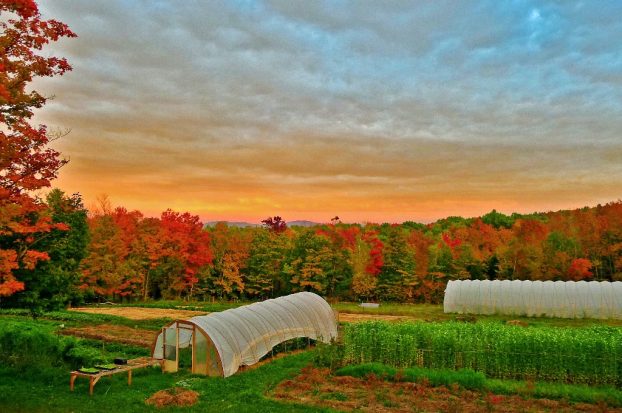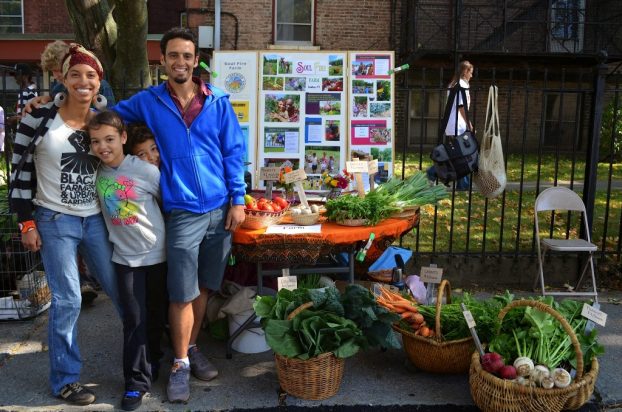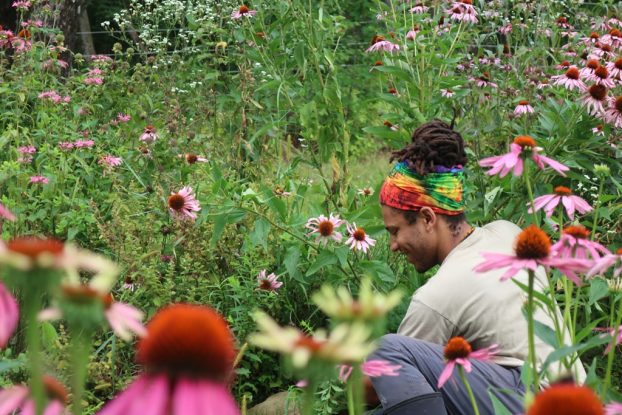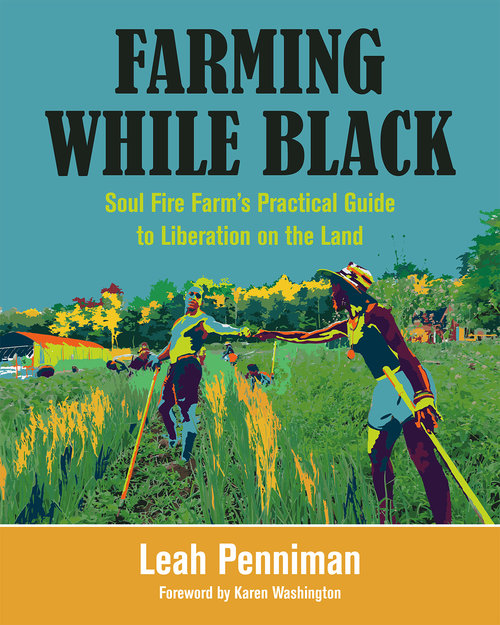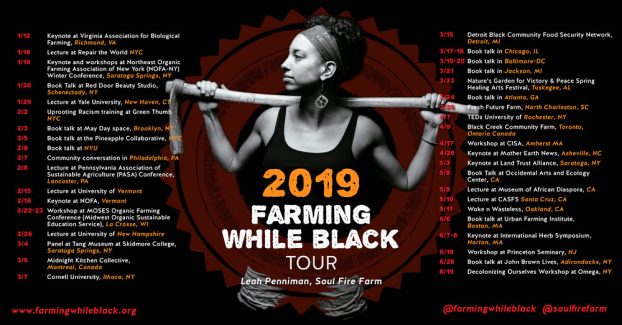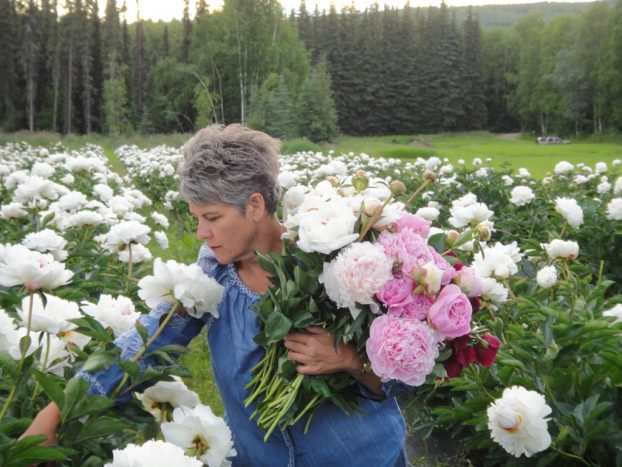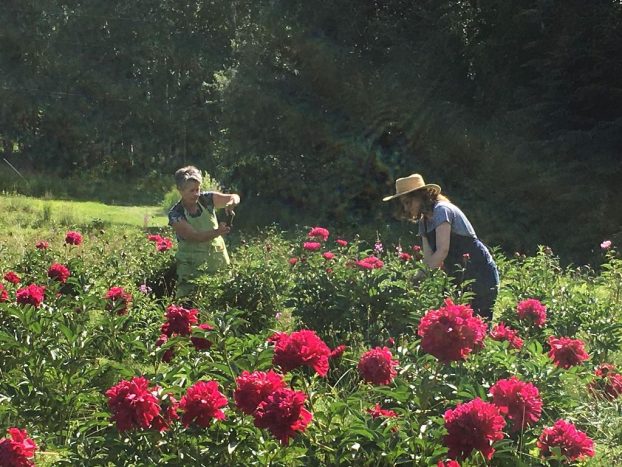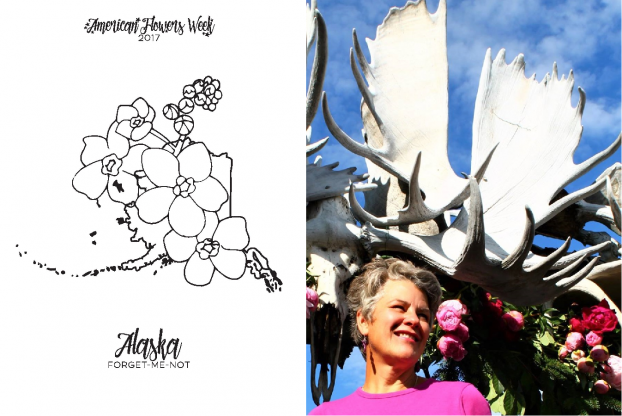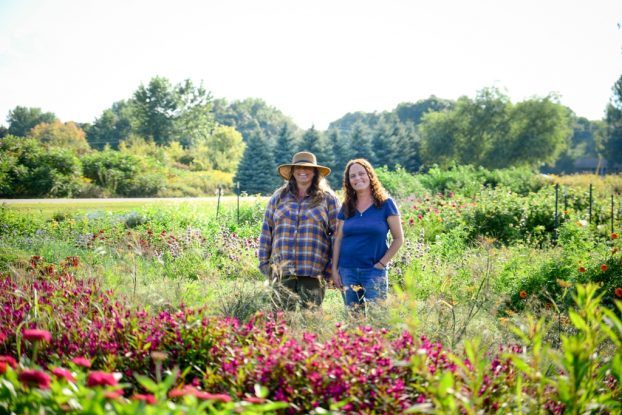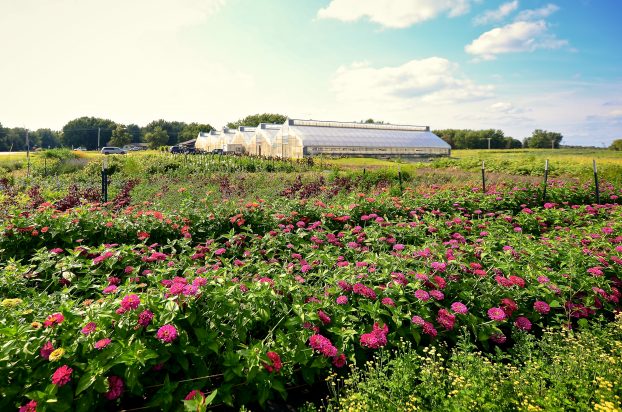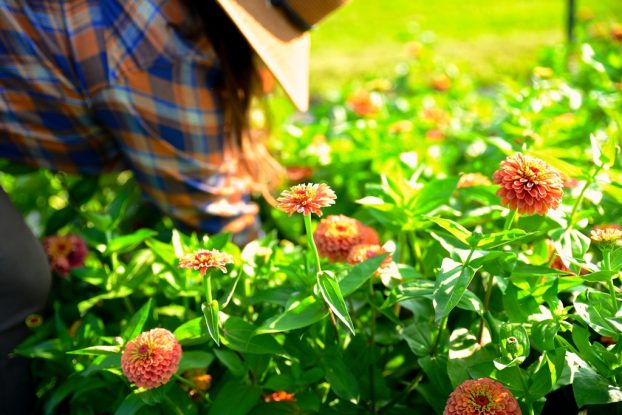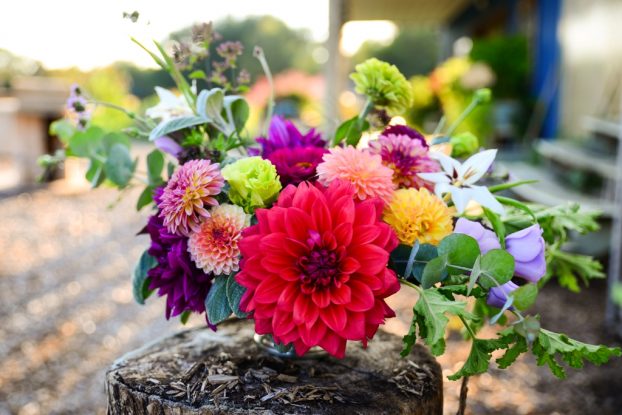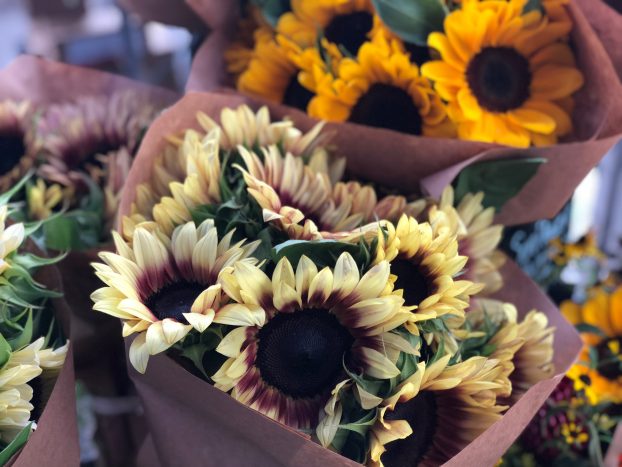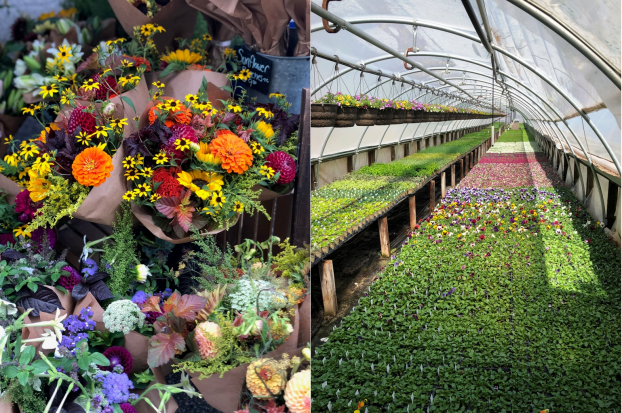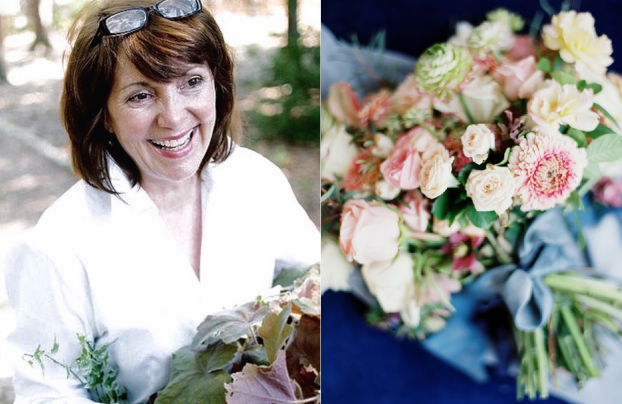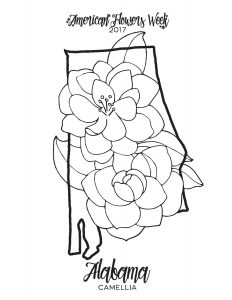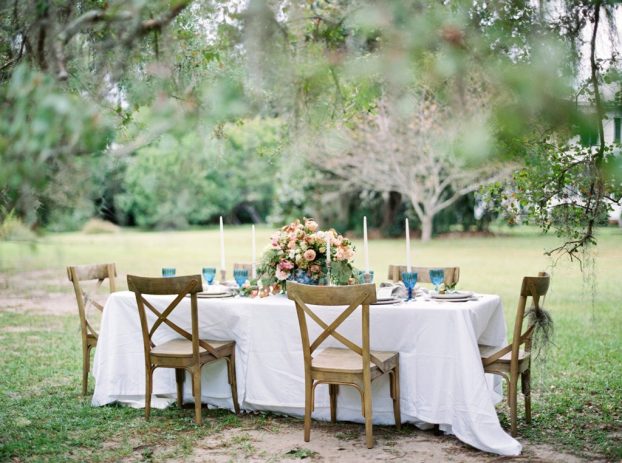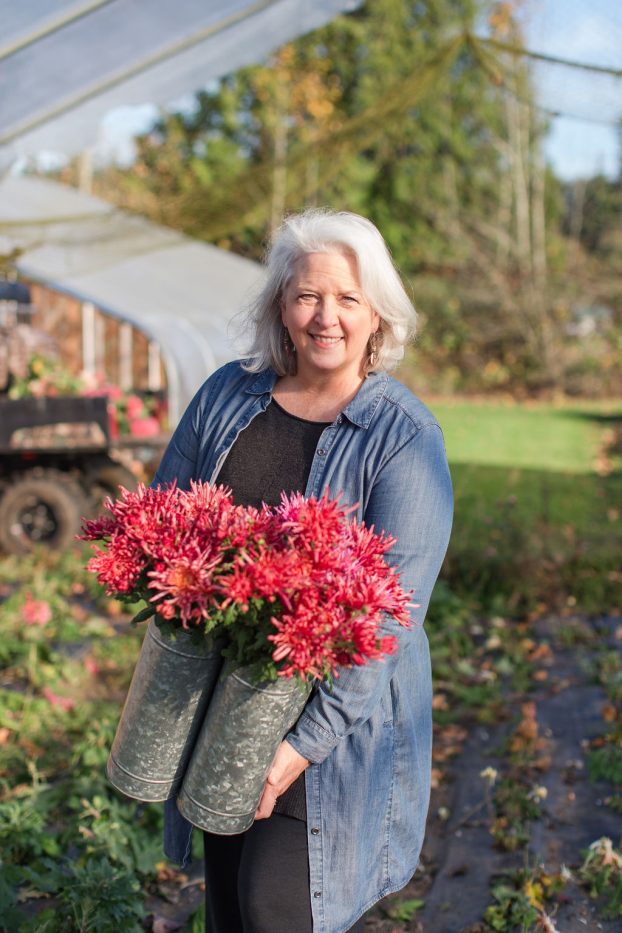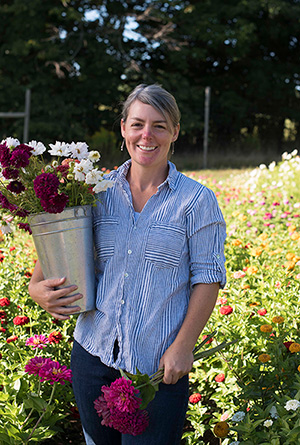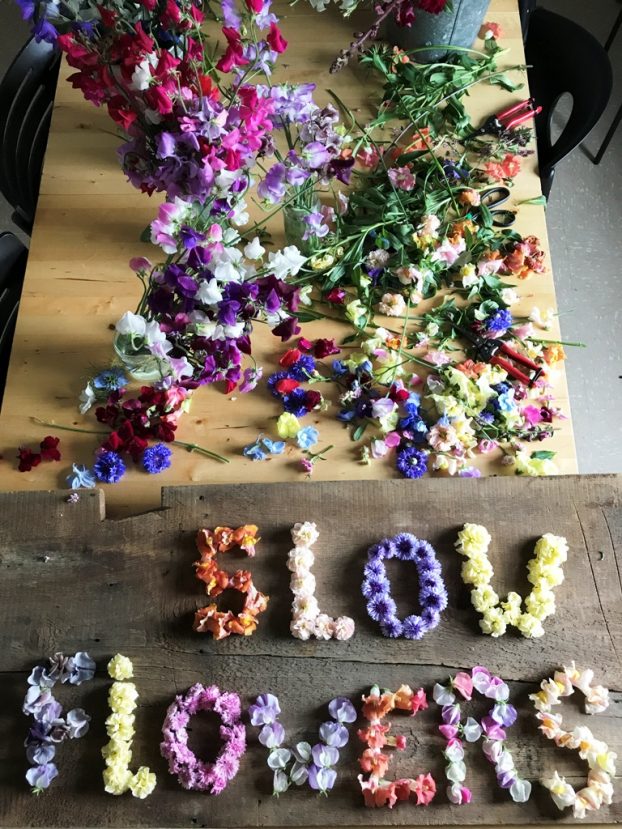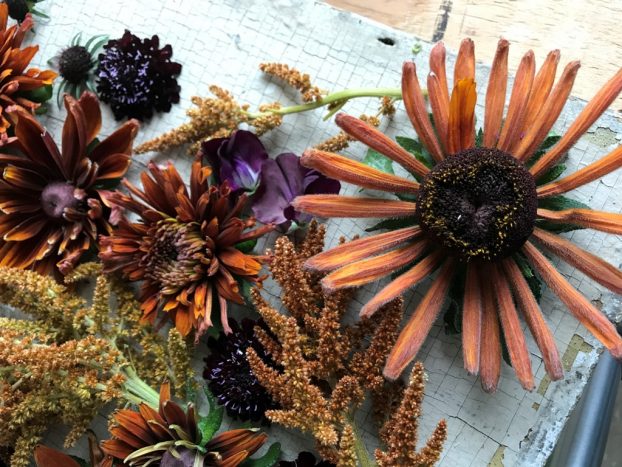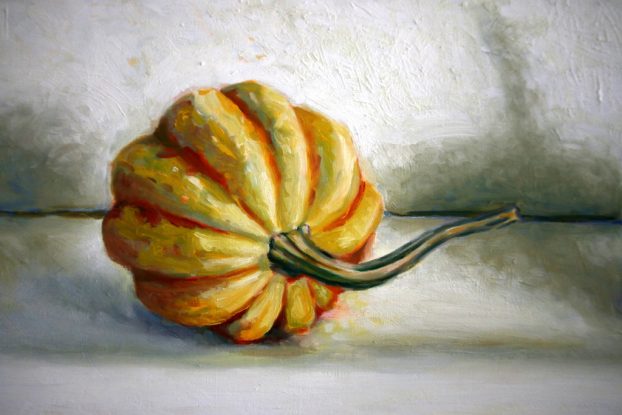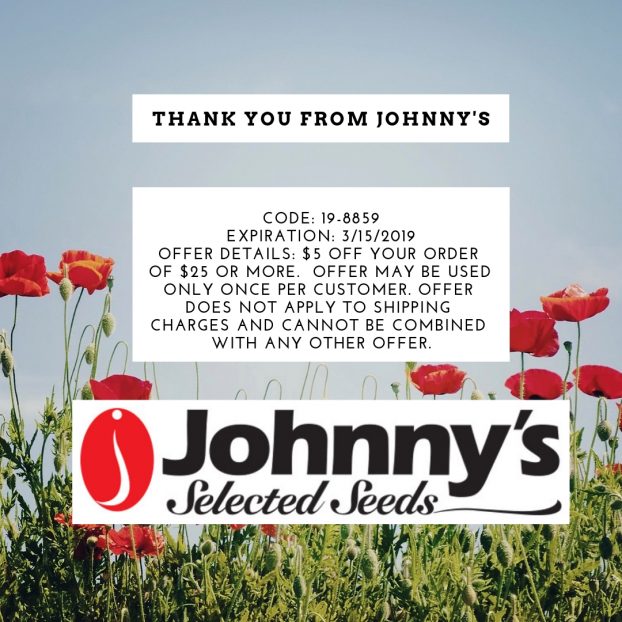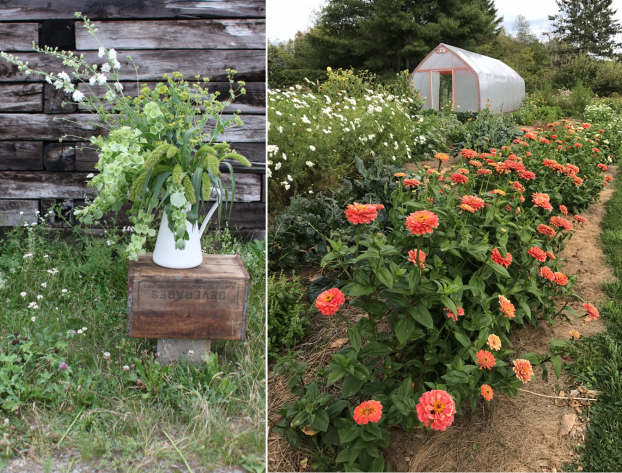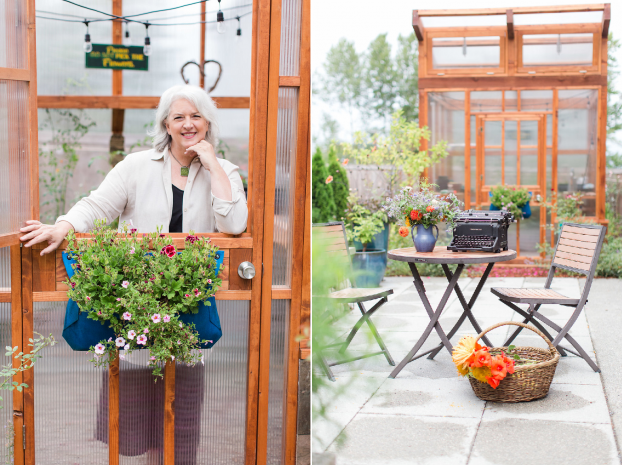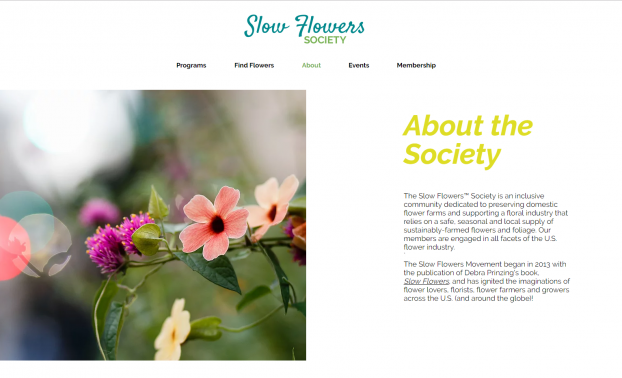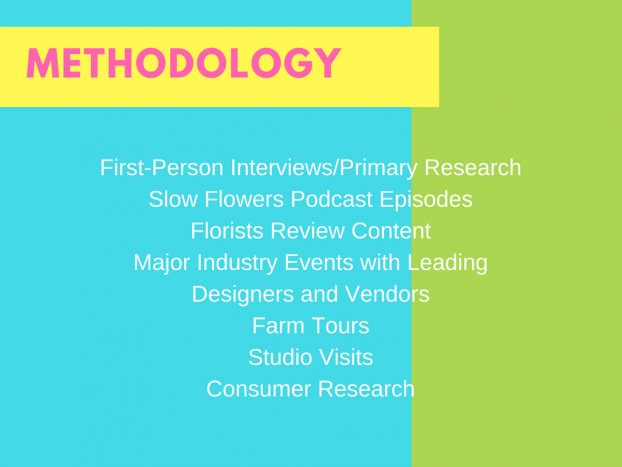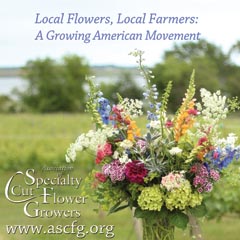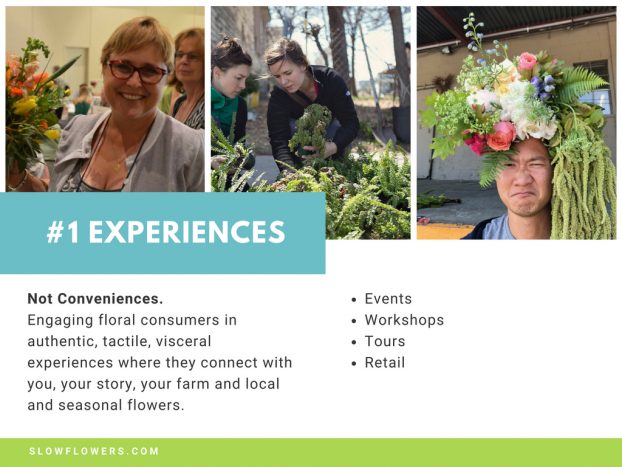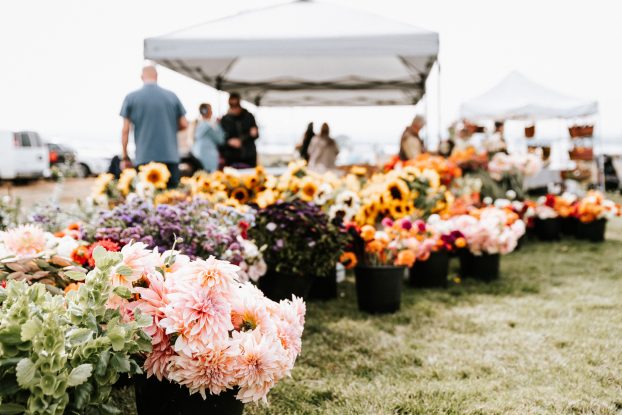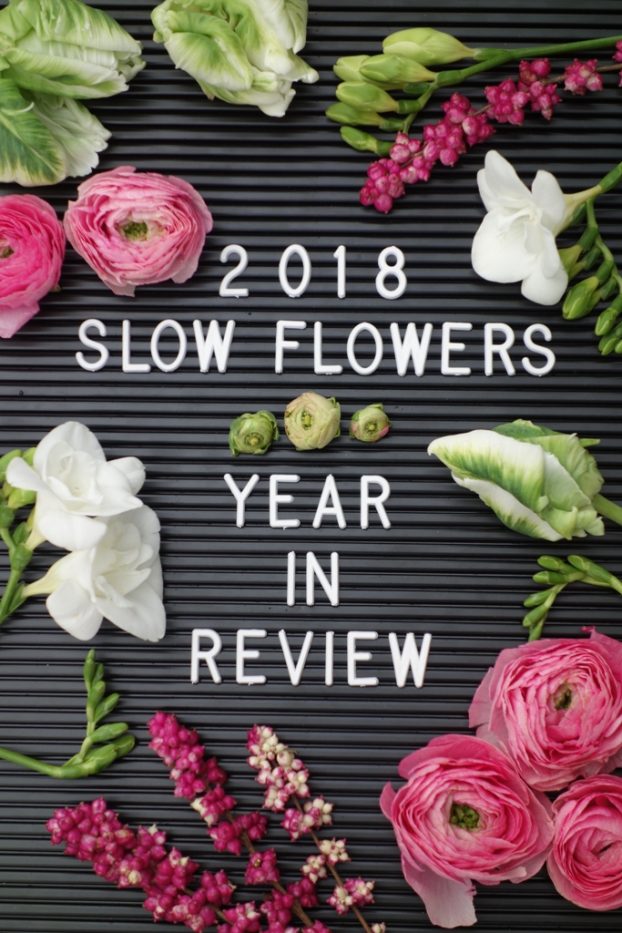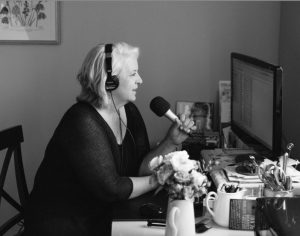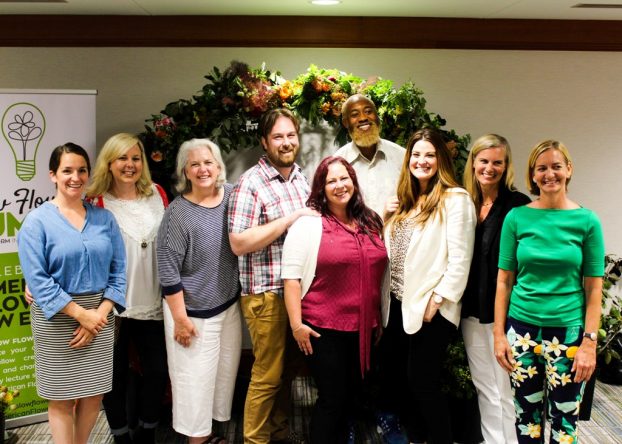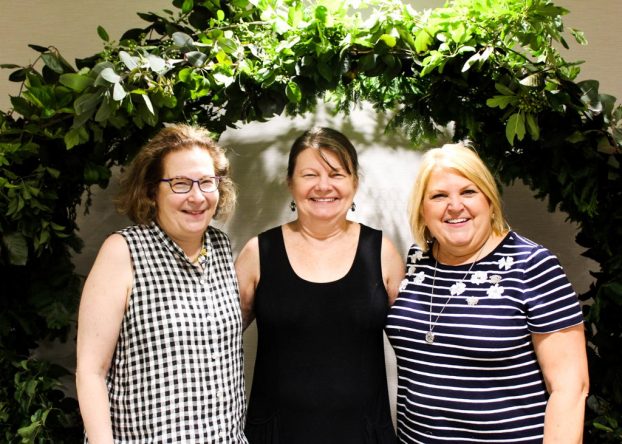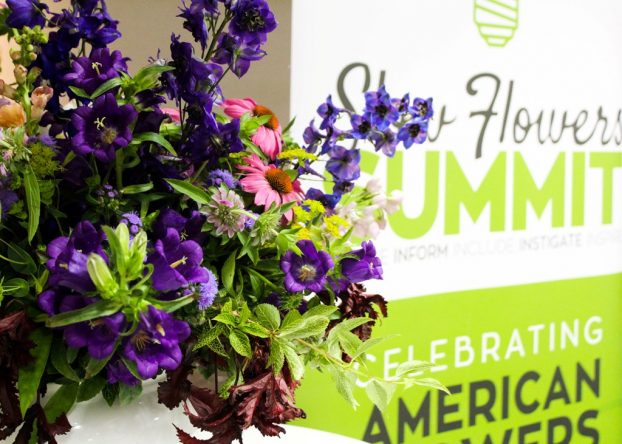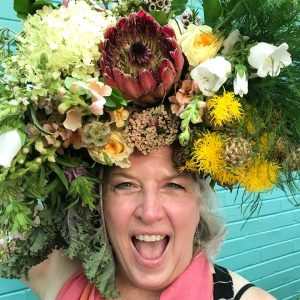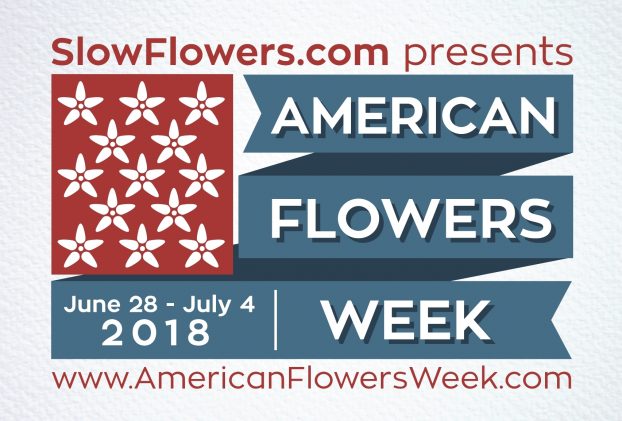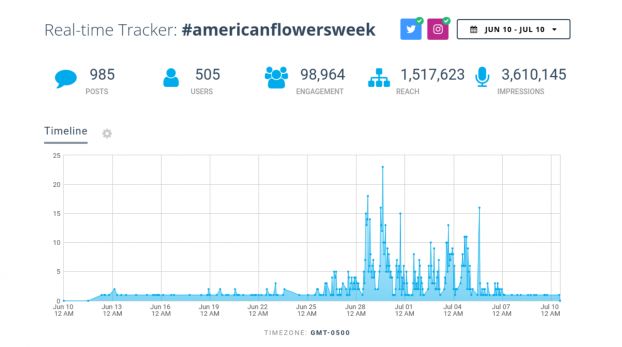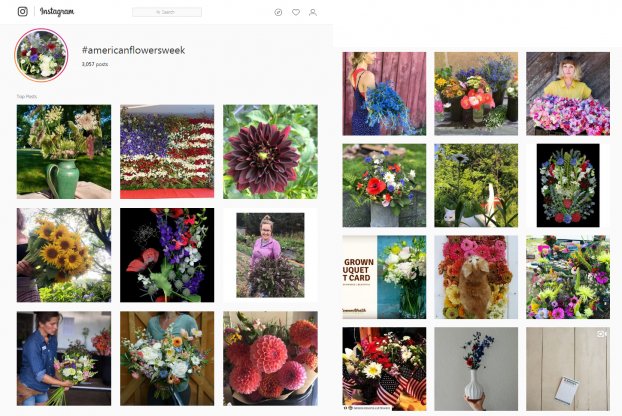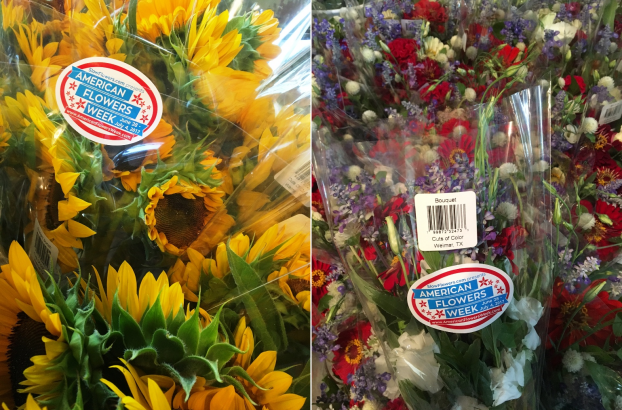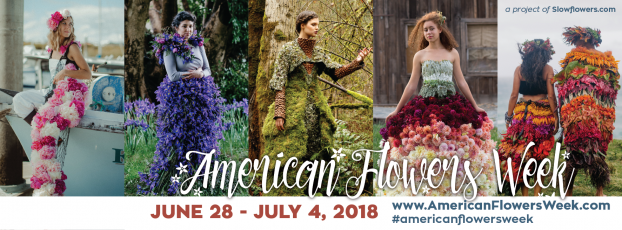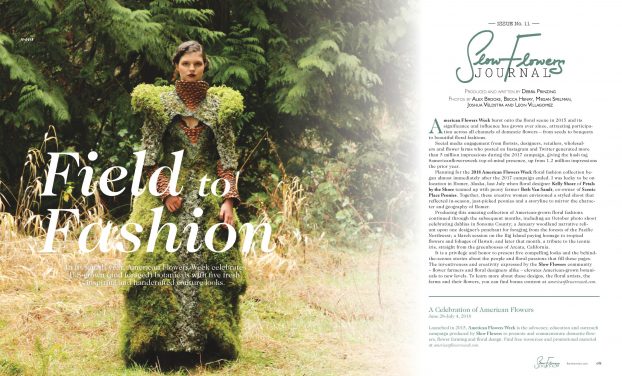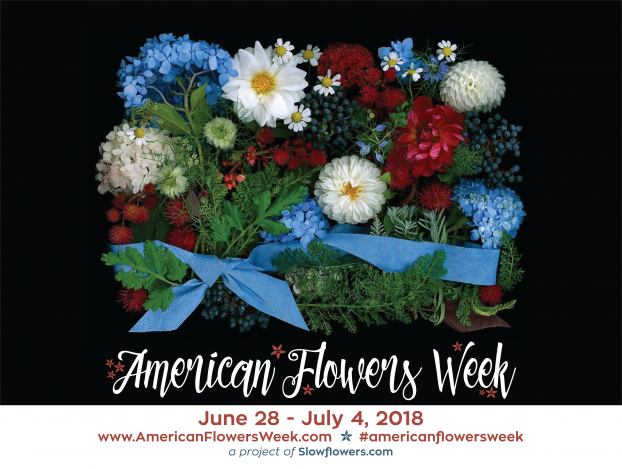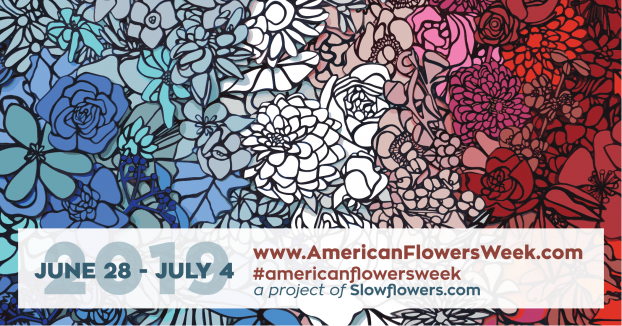Podcast: Play in new window | Download
Subscribe: Apple Podcasts | Podcast Index | | More
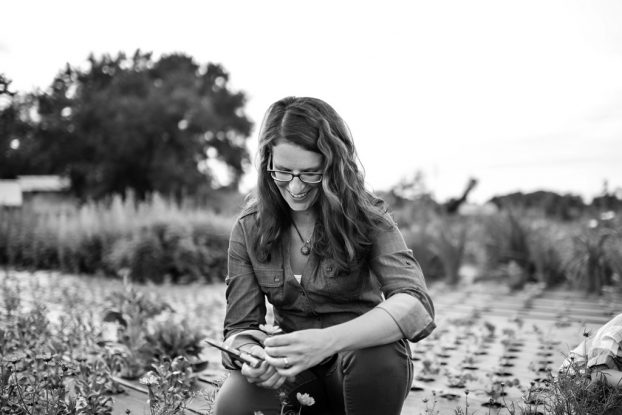
Rachael Ackerman of Blue Sky Flower Farm (c) Photography by Red Bird Hills
June 30th may seem like a long way off, but we all know how soon your the flower farming season arrives next spring, followed quickly by wedding and event season for floral designers.
So bear with me as we fast-forward to June 30, 2019, the day before the Slow Flowers Summit takes place on July 1st & 2nd in St. Paul, Minnesota.
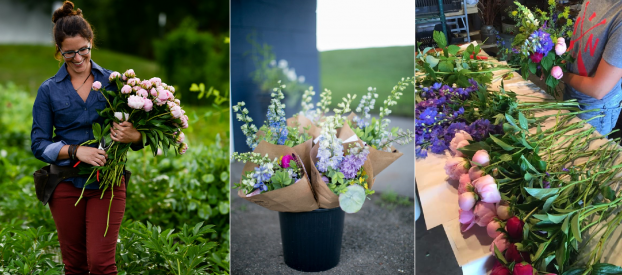
Rachael (left) with her peonies; CSA bouquets (center); the abundant floral harvest (right)
Perhaps you’re planning to arrive in the Twin Cities early and if so, you’re invited to participate in our optional pre-conference farm tours and Slow Flowers Dinner on the Farm, two fantastic opportunities to learn more about the flora of Minnesota, including a lovely and educational visit to Blue Sky Flower Farm, owned by today’s guest, Rachael Ackerman.
I’ll share more details about the actual tour schedule immediately after our interview, but let me start by saying how thrilled I am that horticultural duo Rachael and Jon Ackerman, owners of Blue Sky Flower Farm, will open their farm on Sunday, June 30th for an exclusive tour welcoming attendees of the Slow Flowers Summit.
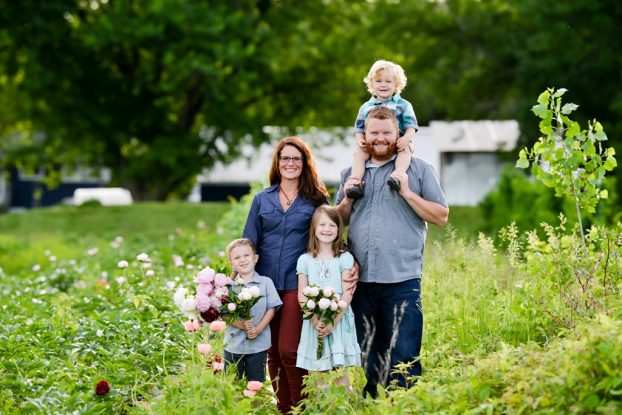
Rachael and Jon Ackerman with their three “minions” at Blue Sky Flower Farm (c) Photography by Red Bird Hills
I met Rachael and Jon in person in 2017 at the ASCFG regional meeting in Ontario, Canada, and soon thereafter, their farm joined the Slow Flowers Movement. They grow a diverse palette of plants on land about 30 miles outside of the Twin Cities in Minnesota and they’re part of the core group of growers who sell through the Twin Cities Flower Exchange, owned by Christine Hoffman, our co-host for the 2019 Summit on July 1st & 2nd.
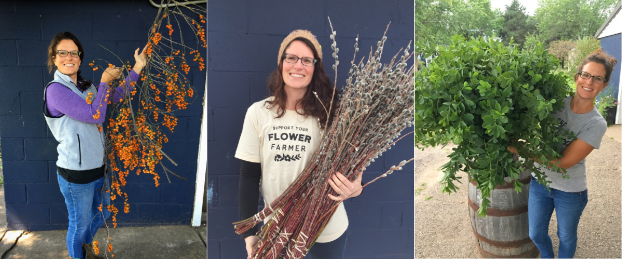
Rachael is often dwarfed by the long branches and prolific foliage she harvests, year-round, at Blue Sky Flower Farm.
I’ve invited Rachael to share their story with us today.
Here’s a little bit more about Blue Sky Flower Farm:
Jon and Rachael dreamed of Blue Sky Flower Farm for many years. They both have horticulture degrees and between them have a combined 30-plus years working in the industry. While working full-time and raising three children, now ages 3, 5 and 7, they started the farm by planting woody cuts, including dogwoods and willows, on Jon’s parents’ dairy farm.
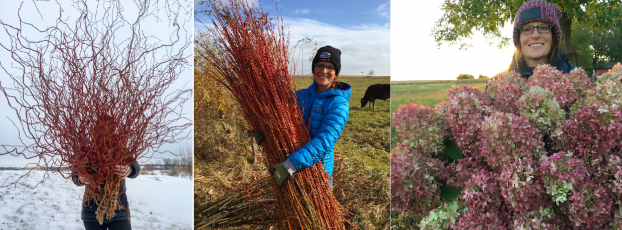
More branches and ornamental blooms! A Blue Sky Flower Farm specialty.
The couple now owns a 10-acre farm near Elko-New Market, Minnesota, south of the Twin Cities, where they have diversified into a year-round operation, with Spring woodies (pussy willows, lilacs, forsythia, mock orange, sweet peas and peonies); Summer crops (ninebark foliage, raspberry foliage, dahlias, baptisia, scabiosa, statice and anemone) Fall crops (bittersweet, sunflowers, rudbeckia, broom corn and unique gourds) and winter crops: flame willows, curly willows, and dogwoods of many colors.
Blue Sky Flower Farm also serves its community through a bouquet shares program each summer. I’ll let Rachael share more about how she and Jon have developed their market channels to serve a number of wholesale clients in both floriculture and horticulture.
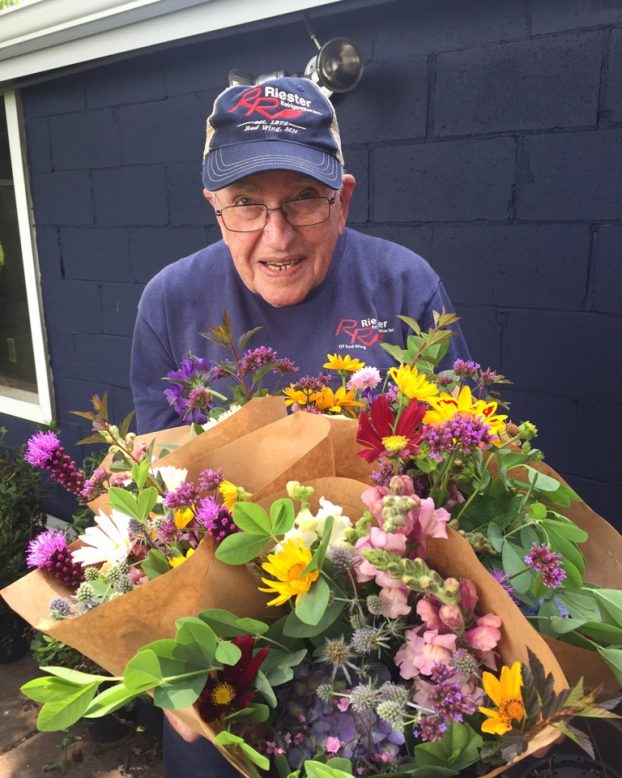
Rachael’s grandfather, who along with her grandmother, helps on the farm once a week.
In the past, before diving deep into flower farming, Rachael and Jon worked in the commercial wholesale nursery industry, including a number of years at Bailey Nurseries Inc., one of the largest plant companies in the U.S.
Because of those ties, it is fitting that we’ve invited Rachael to join the stage at the Slow Flowers Summit and introduce our keynote speaker, Terri McEnaney, president of Bailey Nurseries.
I’m thrilled that Rachael and Jon will open their flower farm and host Slow Flowers Summit’s attendees to experience a summer afternoon on their uniquely beautiful Minnesota flower farm.
Their farm will be open between 1-3 pm on Sunday, June 30th, for self-guided touring — we’ll post more details prior to the Slow Flowers Summit.
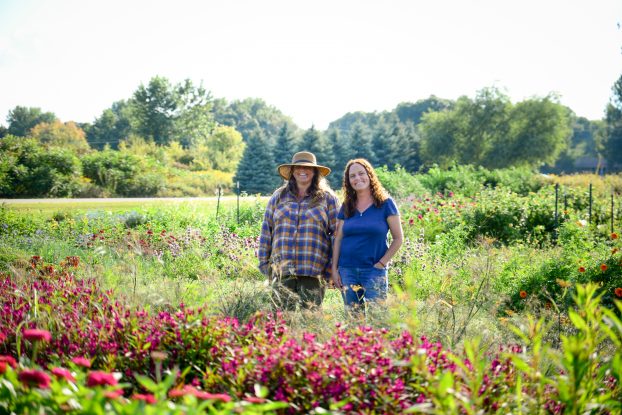
Slow Flowers Dinner on the Farm hosts, Jolea Gress and Jenny of Green Earth Growers
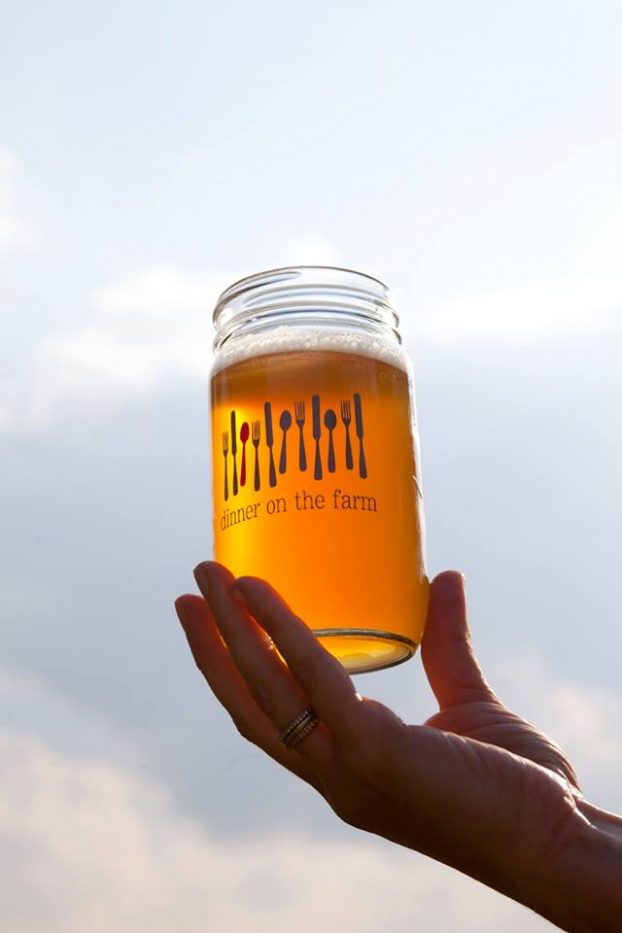 Immediately following our time at Blue Sky Flower Farm, attendees are invited to tour a second venue, Green Earth Growers, a women-owned enterprise specializing in nursery bedding plants, vegetables AND flowers.
Immediately following our time at Blue Sky Flower Farm, attendees are invited to tour a second venue, Green Earth Growers, a women-owned enterprise specializing in nursery bedding plants, vegetables AND flowers.
The tour of Green Earth Growers is free, but you’ll need to register separately for the first-ever Slow Flowers Dinner on the Farm, an evening of locally-grown food, flowers, entertainment and camaraderie.
Tickets are $100 inclusive and you can find more details here. We’re partnering with Green Earth Growers’ owners Jolea Gress and Jenny for this event, and I promise to feature them and their stories on this podcast in the near future.
The farm-to-table dinner is a production of Monica Walch, owner of the successful Dinner on the Farm series that takes place each year in the St. Paul-Minneapolis area.
Dinner on the Farm creates unique local food experiences designed to celebrate farmers, growers, chefs, brewers, distillers, makers and artisans dedicated to good, sustainable food. Through a series of roaming culinary events, Monica and her collaborators work to connect people back to the land and to the farmers and artisans who are making their community a better place to live.
 If you attend the Slow Flowers Dinner on the Farm, you’ll join with me in an intimate, sensory evening celebrating our true sense of community with other Summit attendees, Slow Flowers members and our Summit speakers in a relaxed environment taking place just prior to the following day’s Summit Conference. I can’t wait to see you there!
If you attend the Slow Flowers Dinner on the Farm, you’ll join with me in an intimate, sensory evening celebrating our true sense of community with other Summit attendees, Slow Flowers members and our Summit speakers in a relaxed environment taking place just prior to the following day’s Summit Conference. I can’t wait to see you there!
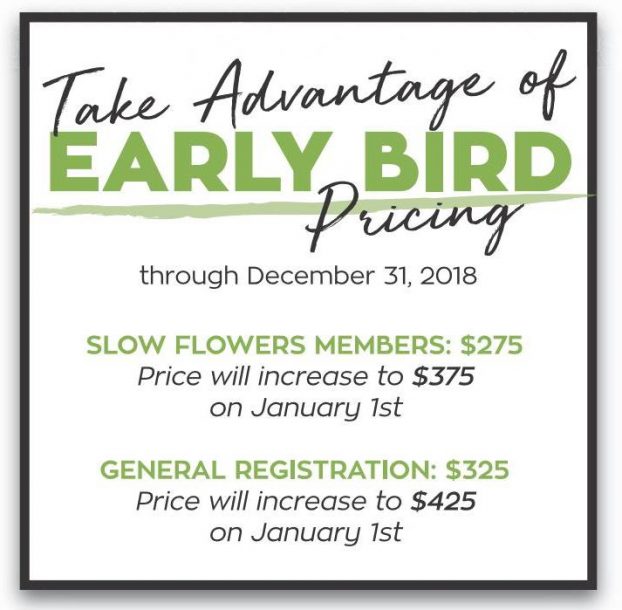 December is the month to take advantage of Early Bird Ticket Pricing for joining us at the Slow Flowers Summit.
December is the month to take advantage of Early Bird Ticket Pricing for joining us at the Slow Flowers Summit.
You can save $100 off if you register before Dec. 31st.
The rate for Slow Flowers member registration is $275, which includes 1-1/2 days of conference sessions, morning refreshments both days, and lunch and a cocktail reception on July 1st, plus a fabulous program, people and flowers.
We have a vital and vibrant community of flower farmers and floral designers who together define the Slow Flowers Movement.
As our cause gains more supporters and more passionate participants who believe in the importance of the American cut flower industry, the momentum is contagious.
I know you feel it, too. I value your support and invite you to show your thanks and with a donation to support my ongoing advocacy, education and outreach activities. You can find the donate button in the column to the right.
 The Slow Flowers Podcast has been downloaded more than 385,000 times by listeners like you. Thank you for listening, commenting and sharing – it means so much. Thank you all!
The Slow Flowers Podcast has been downloaded more than 385,000 times by listeners like you. Thank you for listening, commenting and sharing – it means so much. Thank you all!
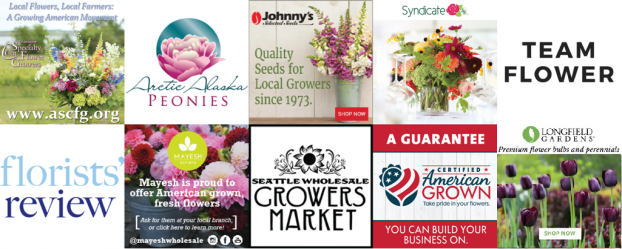 Thank you to our sponsors for supporting The Slow Flowers Podcast.
Thank you to our sponsors for supporting The Slow Flowers Podcast.
Florists’ Review magazine. I’m delighted to serve as Contributing Editor for Slow Flowers Journal, found in the pages of Florists’ Review. It’s the leading trade magazine in the floral industry and the only independent periodical for the retail, wholesale and supplier market. Take advantage of the special subscription offer for members of the Slow Flowers Community.
Arctic Alaska Peonies, a cooperative of passionate family farms in the heart of Alaska providing bigger, better peony flowers during the months of July and August. Visit them today at arcticalaskapeonies.com
Seattle Wholesale Growers Market, a farmer-owned cooperative committed to providing the very best the Pacific Northwest has to offer in cut flowers, foliage and plants. The Growers Market’s mission is to foster a vibrant marketplace that sustains local flower farms and provides top-quality products and service to the local floral industry. Find them at seattlewholesalegrowersmarket.com
Longfield Gardens provides home gardeners with high quality flower bulbs and perennials. Their online store offers plants for every region and every season, from tulips and daffodils to dahlias, caladiums and amaryllis. Visit them at longfield-gardens.com.
Syndicate Sales, an American manufacturer of vases and accessories for the professional florist. Look for the American Flag Icon to find Syndicate’s USA-made products and join the Syndicate Stars loyalty program at syndicatesales.com.
Johnny’s Selected Seeds, an employee-owned company that provides our industry the best flower, herb and vegetable seeds — supplied to farms large and small and even backyard cutting gardens like mine. Check them out at johnnysseeds.com.
Association of Specialty Cut Flower Growers. Formed in 1988, ASCFG was created to educate, unite, and support commercial cut flower growers. It mission is to help growers produce high-quality floral material, and to foster and promote the local availability of that product. Learn more at ascfg.org
Mayesh Wholesale Florist. Family-owned since 1978, Mayesh is the premier wedding and event supplier in the U.S. and we’re thrilled to partner with Mayesh to promote local and domestic flowers, which they source from farms large and small around the U.S. Learn more at mayesh.com.
Certified American Grown Flowers. The Certified American-Grown program and label provide a guarantee for designers and consumers on the source of their flowers. Take pride in your flowers and buy with confidence, ask for Certified American Grown Flowers. To learn more visit americangrownflowers.org.
And the Team Flower Conference – a professional floral event where flower lovers from all over the world gather for networking, learning, and celebration. It’s a special time for the floral industry to come together and whether you’re a farmer, designer, wholesaler, or just love flowers, you’re invited to attend as Team Flowers dreams big for the industry’s future. Head to teamflower.org/slowflowers to learn more about the 2019 conference in Waco, Texas!
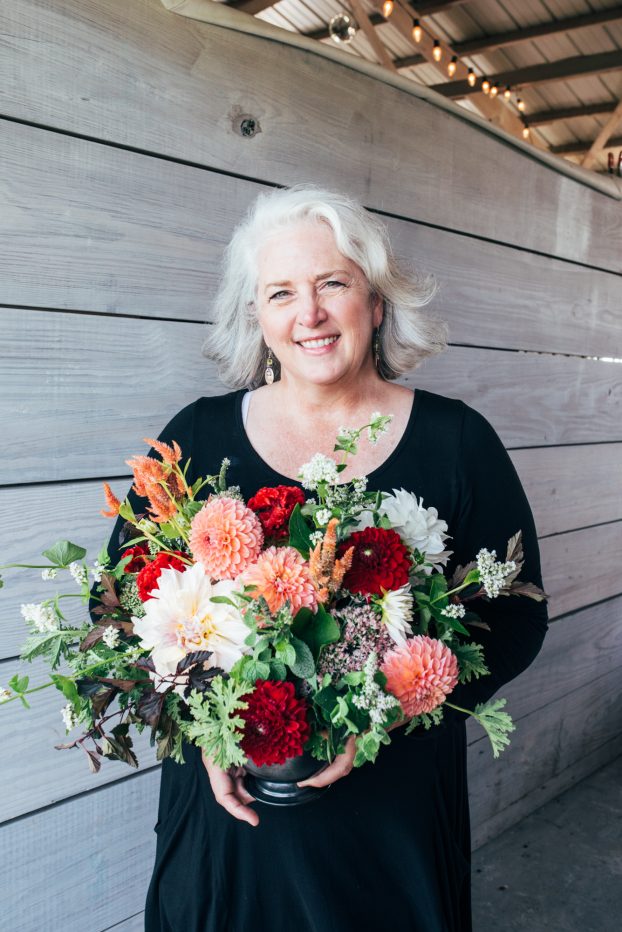
PepperHarrow Farm (c) Liz Brown @estorie
I’m Debra Prinzing, host and producer of the Slow Flowers Podcast.
Next week, you’re invited to join me in putting more American grown flowers on the table, one vase at a time. And If you like what you hear, please consider logging onto iTunes and posting a listener review.
The content and opinions expressed here are either mine alone or those of my guests alone, independent of any podcast sponsor or other person, company or organization.
The Slow Flowers Podcast is engineered and edited by Andrew Brenlan. Learn more about his work at soundbodymovement.com.
Music Credits:
Heartland Flyer; Perspiration
by Blue Dot Sessions
